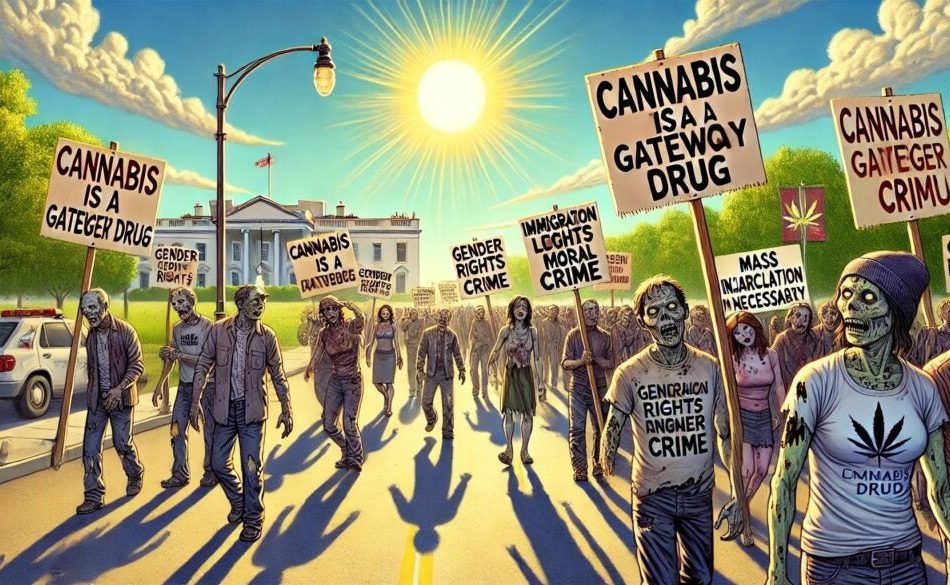Weed, Fear And Control This Halloween: Conservatives Revive Zombie Myths To Hijack The Debate
As cannabis legalization spreads across the U.S., a conservative narrative is transforming the debate, turning cannabis into a tool for broader political battles. By linking it to divisive issues like immigration and gender rights, conservatives across states are shifting attention away from the tangible benefits of legalization.
Instead, they push viral, fear-based storytelling designed to evoke outrage and control. This strategy isn’t incidental—it’s calculated to exploit social media’s monetization model, where emotionally charged content spreads rapidly and dominates the conversation.
In this environment, cannabis becomes more than a public health or economic issue—it’s a symbol in a larger culture war. These viral narratives sustain policies that disproportionately affect marginalized communities, keeping them trapped in cycles of incarceration and poverty.
- Get Benzinga’s exclusive analysis and the top news about the cannabis industry and markets daily in your inbox for free. Subscribe to our newsletter here. You can’t afford to miss out if you’re serious about the business.
Weaponizing Cannabis To Strip Rights
In an amicus brief to the U.S. Supreme Court, ten Republican governors, led by South Carolina Gov. Henry McMaster, drew a parallel between state flexibility in legalizing cannabis and their desire for similar autonomy in banning gender-affirming care for minors.
The governors argue that just as states have the right to create their own cannabis policies despite federal prohibition, they should also have the authority to restrict transgender healthcare practices.
The case, United States v. Skrmetti, brought by transgender youth challenging a Tennessee law, uses cannabis legalization as an example to support their stance on local governance over controversial medical issues.
This selective framing of cannabis policy as a justification for restricting transgender rights highlights how the issue of legalization is being co-opted into a broader conservative agenda. By intertwining cannabis with highly charged topics, the GOP’s conservative narrative aims to divert the conversation from cannabis’ health or economic benefits and instead push it into cultural battlegrounds.
Read Also: DEA’s 50-Year $1 Trillion Drug War: Why Were There 250K Marijuana Arrests In 2022?
Pot, Papers And Panic: Arkansas Conservatives Tie Medical Cannabis To Immigration Fears
Meanwhile, in Arkansas, a conservative nonprofit is using similar tactics to oppose a proposed medical marijuana reform. The Family Council Action Committee claims that the amendment would turn the state into a “drug use destination” for undocumented immigrants.
Jerry Cox, the group’s executive director, has tied medical marijuana access to immigration fears, warning that the proposed law could allow “illegal immigrants” to obtain medical cannabis cards, despite safeguards requiring valid state identification.
Supporters of the measure, including the group Arkansans for Patient Access, have denounced these claims as baseless fear-mongering, pointing out that 24 other states allow recreational cannabis without similar consequences.
They argue that the amendment is focused on expanding access for rural and low-income residents and that linking cannabis reform to immigration is a deliberate attempt to inflame public sentiment.
Locked Up And Loaded: How Conservative Fear-Mongering On Cannabis Keeps Jails Full And Progress Stalled
These examples illustrate a broader trend in conservative media: reframing cannabis as a proxy for politically charged debates on immigration and gender rights while hiding the real economic and social consequences.
By shifting attention to issues that evoke fear and moral panic, these narratives perpetuate policies that disproportionately affect marginalized communities. The rhetoric around cannabis in conservative circles is not just about cultural values, it helps uphold a political economy that thrives on mass incarceration and structural poverty.
Cannabis criminalization has long been a tool used to incarcerate Black and Latino communities. Even as some states legalize cannabis, many people remain behind bars for non-violent cannabis offenses, trapped in a system that blocks access to housing, employment, and education.
Read Also: It’s Your Constitutional Right: How You Can Break The Senate’s Block On Cannabis Legalization
Trapped In The Loop: How Conservative Narratives Sustain Inequality
These conservative narratives help maintain this cycle by deflecting from the root issues – poverty, systemic racism, and over-policing – that keep people incarcerated and economically marginalized.
Conservative media benefits from this framing by generating content that plays well in algorithms, creating fear-based stories that spread quickly and keep their audience engaged.
Meanwhile, the policies they support ensure that a legal system dependent on incarceration continues to thrive, preserving the structural inequalities that keep poor and minority populations in jail and out of economic opportunity.
Much like how the NRA has rebranded the AR-15 as a “modern sporting rifle,” emphasizing its use in hunting and sport to soften its image, cannabis is similarly being pulled into a signifier-signified game. Despite this harmless rebranding, AR-15s have been at the center of many tragic mass shootings.
Beyond academic theory—it’s how communication operates in media today. By linking cannabis to hot-button issues, conservative voices aim to delay legalization by making it part of a larger culture war, ultimately slowing progress while profiting from the viralization of these debates.
Read Next: Medical Marijuana Dispensaries Near Preschools In Arizona? Court of Appeals Says Yes
© 2024 Benzinga.com. Benzinga does not provide investment advice. All rights reserved.


Leave a Reply